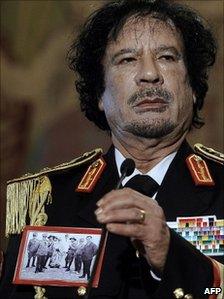History through Libyan eyes
- Published

Libyans are well aware of their long and largely painful history with Western powers - even if many in the West are not.
It's a national holiday in Libya today. One of several declared by Col Muammar Gaddafi, but with an ironic twist this year, with British warplanes currently bombing from the skies above.
In Libya, 28 March is British Evacuation Day, to mark the final departure of British forces in 1970.
Later the same year, the Americans packed up their own airbase too - hoping to stay on good terms with the newly-installed Col Gaddafi to protect their oil interests in Libya.
It's a reminder that the main players in the Western coalition have a lot more history there than outsiders realise - but which Libyans themselves do not forget.
While rebels in Benghazi have pleaded for outside help and have cheered the air strikes, they have made clear they don't want deeper foreign intervention like ground troops.
However desperate they are to see the back of Col Gaddafi, they still suspect Western intentions.
It's not only because the West was happy to do business with him just a short time ago.
Resistance hero
There's a deeper suspicion borne of past experiences - especially as the four countries leading the military campaign - the US, Britain, France and Italy - are those that have been most involved in Libya before.
Italy has the darkest record.
It invaded Tripoli in 1911, hoping the Libyans would see this as a liberation from Ottoman rule. Instead it provoked 20 years of rebellion.
Then as now, it was the region around Benghazi that was the main rebel domain, under the leadership of Omar al-Mukhtar.
Italy's fascist dictator Benito Mussolini eventually crushed the uprising with mass punishment tactics.
Over 100,000 Libyans were deported from rebel strongholds to concentration camps. Thousands died.
In 1931, the Italians captured Omar Mukhtar himself and hanged him in front of his followers - turning him into a martyr and hero.
As they battle Col Gaddafi, today's Benghazi rebels invoke his name.
But Gaddafi has also sought to use Mukhtar's allure for his own ends - to the disgust of many Libyans - even wearing a photograph of the rebel leader on his clothes during meetings two years ago with the Italian prime minister Silvio Berlusconi to sign a raft of business deals.
But while Libyans remember what the Italians did to their country, far fewer Italians do.
British rule
Less well-known outside Libya is British, French and American history there - after they drove out the Italians in World War II and occupied it themselves - with the British controlling most of the country, including Tripoli and Benghazi.
As with their other Middle East dominions, the British and French occupation authorities did their best to resist pressure for Libyan independence.
The name Omar Mukhtar was soon being heard as nationalists rallied people to their cause - the British responded by closing their newspaper.
There was even greater fury when London came up with a plan in 1949 to divide its three main regions between itself, France and, incredibly, Italy, the former colonial power.
The new superpower, the United States, intervened at the United Nations to stop the British plan - but not because it cared about Libyan aspirations.
Washington now saw Libya - with its long coastline, in the middle of the Mediterranean - as a strategic prize in its struggle with the Soviet Union and was expanding its huge Wheelus airbase just outside Tripoli.
Originally built by the Italians, almost 5,000 Americans and scores of aircraft were based there by the 1960s.
Libya became independent in 1951, under King Idris, but still remained a British protectorate - with both the UK and the US maintaining their military bases and control over the country's foreign and defence policies.
Commercial oil discoveries in the late 1950s gave both governments even more incentive to keep things as they were - until a young signals captain called Muammar Gaddafi seized power in 1969.
His decision to nationalise oil production, to get a majority share of revenues, and to demand the closure of the British and American bases were widely popular.
It's said the British wanted to send in SAS-trained mercenaries to arrange a counter-coup to restore the king, until the Americans intervened - apparently deciding Col Gaddafi would be a reliable anti-communist.
Not that it helped the US anymore than the UK to keep its base - by September 1970 all the Americans were gone too.
- Published10 June 2009